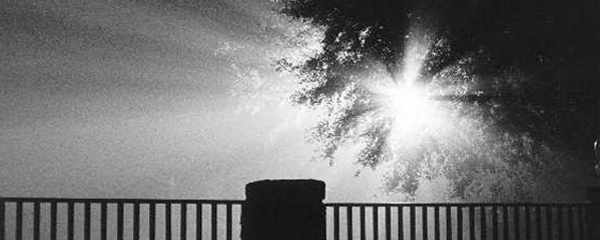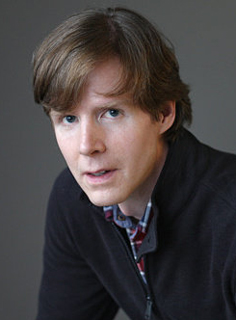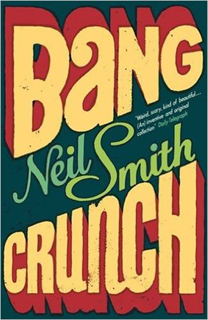
('Light Escaping' © John Menke, 2006)
THE CANADIAN ACROBAT
by ZOË APOSTOLIDES
Bang crunch. Boo. Short, punchy little words that form the titles listed under Neil Smith’s bibliography, a two-fold double-act. They’re compact, blunt Anglo-Saxon names, scant on syllables. Their almost childlike, onomatopoeic immediacy defies expectations of the content lying within the covers, and then, you start reading. I love how these titles give nothing away.
Bang Crunch, the first and only collection of short stories by this quiet, unassuming Canadian arrived on the scene in 2008. Smith’s output has been slow: a measured, thoughtful release – he takes time to allow his stories to percolate. His first novel, Boo, was published last year: it’s narrated by a dead thirteen-year-old in a heaven reserved exclusively for children of that age (although any resemblance to The Lovely Bones ends there). I found the novelist before the short story writer, so to speak, and searched for more of Smith’s work. As I discovered, there isn’t much. Relative obscurity means his fans are scarce, and critical opinion brief.
Smith works in Montreal, and came to writing almost by accident: “I decided to take a writing course the way someone would decide to take basket-weaving or yoga, as a one-time thing,” said Smith in a recent interview with Quill & Quire.
“I never thought about being a writer or getting published. I had an evening to kill. Every step has happened and happened rather easily, almost embarrassingly so. I guess I’m due to be hit by a bus.”
It was during his second (and last) writing class that his teacher, Connie Barnes Rose, encouraged him to send out some of his stories.
 There is no overriding theme to the collection, though it does reveal a telescopic focus on the extraordinary within the seemingly ordinary. The stories combine the dark comedy of Roald Dahl, the emotional clairvoyance of Flannery O’Connor, the sinister foreboding of Joyce Carol Oates, and the linguistic tap-dancing of George Saunders. They are biting, barbed and funny. They leave a lingering taste, though I can never decide if it is pleasant or horrifying, and more’s the pleasure for it. Take ‘Isolettes’, a brave trailblazer of a story and the collection’s first. It begins with a waiting mother and some ominously technicolour tubes:
There is no overriding theme to the collection, though it does reveal a telescopic focus on the extraordinary within the seemingly ordinary. The stories combine the dark comedy of Roald Dahl, the emotional clairvoyance of Flannery O’Connor, the sinister foreboding of Joyce Carol Oates, and the linguistic tap-dancing of George Saunders. They are biting, barbed and funny. They leave a lingering taste, though I can never decide if it is pleasant or horrifying, and more’s the pleasure for it. Take ‘Isolettes’, a brave trailblazer of a story and the collection’s first. It begins with a waiting mother and some ominously technicolour tubes:
The skin of her chest is so thin. The baby’s mother can almost see the tiny organs beneath, the way shrimp is visible under the rice paper of a spring roll […] To the mother, the baby, with its blue-black eyes, is an extraterrestrial crash-landed on her planet. Hidden away and kept alive by G-men while they assess what threat this tiny alien might pose.
An – who at university ‘sliced two letters off her first name… like the indefinite article’ – becomes pregnant by her friend Jacob, who acted as a sperm donor. She gives birth between the twenty-third and twenty-fourth week of her pregnancy, so the pair watch their daughter’s first days in the world at the Neonatal Intensive Care Unit: ‘the doctors pronounce it Nick U, as if it were a university.’
Smith expertly switches between An’s life as it was and how she lives now. Will the baby survive, and even if it does, An wonders, should it? What sort of mother will she be if she’s having thoughts like this, anyway? An works as a translator, like Smith himself, and an inability to comprehend the ‘hot alphabet soup of acronyms’ dropped by doctors reveals the places where language – clinical, medical and potentially fatal – cannot salve the situation or make it any more comprehensible.
Her head is so heavy, her skull a playpen strewn with the new words she’s learned. Extremely premature babies are micro-preemies. The incubators are called isolettes. Then there’s the whole litany of words for what can go wrong.
Still, the wonderfully tongue-in-cheek theme of An’s baby shower – showers – sees her friends accompanying her to the stage musical Les Parapluies de Cherbourg, where her mother plays an umbrella-shop owner in Normandy – her makeup ‘as cracked as a Rembrandt’. Phase two takes place at a nightclub called ‘Wet’, where ‘up onstage, a stripper wagged his genitals like a clown twisting a dachshund out of party balloons’.
It’s unusual to find a writer who manages the deft task of zoning in on the minutiae of major public tragedy. The story ‘Scrapbook’ attempts to find human quirks, and therefore humanity, in an act of social terrorism. Smith takes the horrific and puts a disarmingly detached spin on it. The story is headed with subsections which gradually sketch a portrait, much like a scrapbook itself. First, we have Amy examining a map of her school that’s littered with stick figures that appear as ‘shadowy grey’. We don’t know what this map depicts, whether the figures are important, whether this fact is crucial to the story or not. It could be nothing or everything.
The stick figures […] are shadowy grey. Except in Room 523. The eight women huddled together on one side of the German class are pale pink. The five men lined up on the other side are deep purple. Like good boys, these purple men filed out of the room when Buddy MacDonald told them to.
The incident is revealed slowly, subtly and unsentimentally. Amy’s boyfriend, Thomas, ‘ran all the way home’ to her when he heard the first shots, deflecting a bullet with Sprechen Sie Deutsch? Now, his grammar book’s glossy cover ‘looks new, despite a gouge hacked into the red stripe. Grey-brown pulp pokes out.’ He hasn’t been outside in ten days. Thomas is German, and was only taking these classes to boost his grades: his parents nicknamed him der Gerpard (the Leopard) – something that tells us so much about how they view him, and how he views himself – a shimmering idea which faded on the day he was witness to a mass shooting. Now Amy has to mix his sleeping pills with apple sauce.
Smith’s novel, Boo, also deals with the aftermath of a school shooting – Oliver, the dead narrator, must come to terms with being the victim of just such an attack. In ‘Scrapbook’, the same willingness to stare tragedy in the eye comes through in just a few short pages. It examines the complexities of Amy’s feelings as a woman towards Thomas, the man who, saved by his gender, ran away. Just as the killer intended, they are divided where once they were a couple. The chasm between them took seconds to appear.
The titular story follows eight-year-old Eepie Carpetrod. This is Eepie’s life, told by her and for her, all in the second person. Her mother, ‘bewildered by her ballooning vocabulary’, takes Eepie for a series of tests:
In between these tests you master longhand and long division, read Madame Bovary, grow 12 inches, and when all the results are back your mum breaks down and curses herself for calling you Eepie, an old lady’s name.
 Eepie has something called Fred Hoyle syndrome, and she’s ageing by a month a day. Smith manages to ensure this fantasy stays firmly away from gimmickery: rather, it’s a study of a condensed life, and the difficulties of quite literally growing up too fast, when your wrinkled, tired hands don’t match your child’s views and child’s voice. On her ninth birthday Eepie turns thirty-six. She grows older and older and then, one day, suddenly, the process is reversed: she de-ages by a year a day. ‘The contraction is much faster than the expansion,’ she says. She understands she’ll die by the weight of her own brain collapsing in on itself, not so much a Big Bang, she tells her mother, as a ‘Big Crunch’. Her mother suggests translating her life into a story, ‘obviously a short one’. She starts in the third person, but it looks impersonal, so she tries the first, but the ‘I’ looks ‘flimsy, as hopeless as a lone chopstick’. Smith takes obvious pleasure in deconstructing the process of storytelling, in the reality behind the artifice. Eepie’s boyfriend Roy, for example, sculpts found objects into art: his latest is ‘a nest of coat hangers from which emerges an umbrella stripped bare, skeletal fingers thrown up jubilantly.’ Smith does much the same thing with his medley of linguistic influences, like a generations-old patchwork quilt.
Eepie has something called Fred Hoyle syndrome, and she’s ageing by a month a day. Smith manages to ensure this fantasy stays firmly away from gimmickery: rather, it’s a study of a condensed life, and the difficulties of quite literally growing up too fast, when your wrinkled, tired hands don’t match your child’s views and child’s voice. On her ninth birthday Eepie turns thirty-six. She grows older and older and then, one day, suddenly, the process is reversed: she de-ages by a year a day. ‘The contraction is much faster than the expansion,’ she says. She understands she’ll die by the weight of her own brain collapsing in on itself, not so much a Big Bang, she tells her mother, as a ‘Big Crunch’. Her mother suggests translating her life into a story, ‘obviously a short one’. She starts in the third person, but it looks impersonal, so she tries the first, but the ‘I’ looks ‘flimsy, as hopeless as a lone chopstick’. Smith takes obvious pleasure in deconstructing the process of storytelling, in the reality behind the artifice. Eepie’s boyfriend Roy, for example, sculpts found objects into art: his latest is ‘a nest of coat hangers from which emerges an umbrella stripped bare, skeletal fingers thrown up jubilantly.’ Smith does much the same thing with his medley of linguistic influences, like a generations-old patchwork quilt.
‘Green Flourescent Protein’ was nominated for Canada’s Journey Prize in 2002 – readers were introduced to the character of Max, a teenage boy struggling with his sexuality. In ‘Funny Weird or Funny Ha Ha’ – another title which nicely encapsulates Smith’s urge to dance the line between humour and sarcasm, between friendly joshing and offence – we meet Max’s mother Peg, a recovering alcoholic who’s just lost her husband. Carl died during a curling championship, and Peg has had his ashes placed in a hollowed-out curling stone which she takes with her around her new home, aware that ‘chatting to her dead husband sounds like the premise of a hokey Hollywood movie’.
One of the central preoccupations to emerge from Bang Crunch is the sense of orderliness versus chaos. All of Smith’s characters have an intense internal conflict, and most manage to keep this quietly under wraps. In ‘Funny Weird’, Peg understands the calming, sobering influence of her dead husband so much more through having lost him. Smith isn’t afraid to paint a portrait of middle-class addiction, the sort where Peg, for instance, can still function day to day:
My late husband used to say that a cucumber could be turned into a pickle, but a pickle could never be changed back into a cucumber. “Once pickled, you stay pickled,” he’d say, “even if you’re no longer soaking in your favourite vinegar.” (My favourite vinegar was a Chablis Drouhin, a Chardonnay with a hint of almond and honey.)
One of Smith’s strongest suits is his use of metaphor, which does exactly what that technique is meant to – namely, show something more clearly, illuminate a point. Peg experiences ‘a familiar, clinging loneliness. Not a blanket or shroud of loneliness, but something thinner, tighter. A leotard of loneliness.’
Bang Crunch is a relatively slim collection, brief and brave and scrutinising. Smith is careful not to provide his readers with easy answers – we have to decide whether An’s indifference is fundamentally wrong or just interesting, or whether Peg’s grief is ‘healthy’. Smith seems careful not to judge. He resists the urge to soapbox, particularly in ‘Scrapbook’. This is a collection of great imagination, but also a great inspiration to writers keen to experiment with the jungle gym that is language. It’s the phrasing, description and imagery within these stories that entrances; they make me want to dive into a dictionary and scribble down whole columns of words. Discovering where your imagination might take you, says Smith, is something we do a lot as children when we’re playing, ‘but don’t often have the chance to do when we’re adults. So writing always feels like returning to the playground to me’.
~
 Zoë Apostolides is a freelance writer and editor. She also works part-time as a literary agent, with a particular interest in children’s and YA novels. Zoë’s writing has appeared in the Financial Times, Good Housekeeping, Spiked, Erotic Review and Lifetime, and she is currently completing a collection of short stories. She lives in southwest London with her partner and dog.
Zoë Apostolides is a freelance writer and editor. She also works part-time as a literary agent, with a particular interest in children’s and YA novels. Zoë’s writing has appeared in the Financial Times, Good Housekeeping, Spiked, Erotic Review and Lifetime, and she is currently completing a collection of short stories. She lives in southwest London with her partner and dog.

